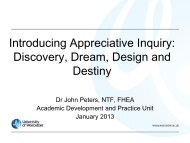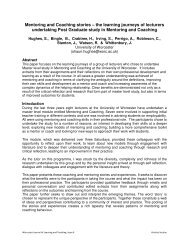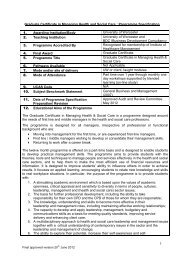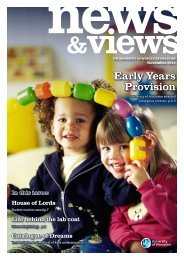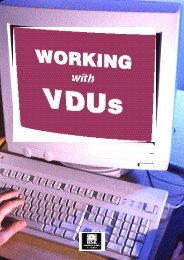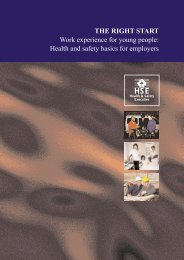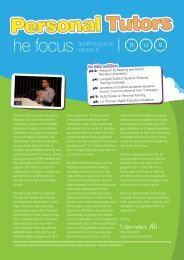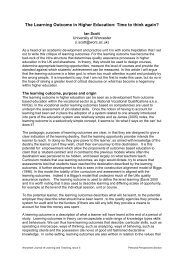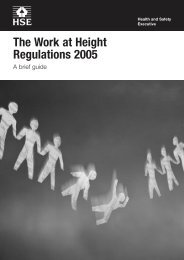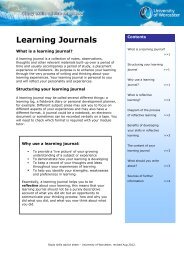Enriching opportunities for people living with dementia: The ...
Enriching opportunities for people living with dementia: The ...
Enriching opportunities for people living with dementia: The ...
You also want an ePaper? Increase the reach of your titles
YUMPU automatically turns print PDFs into web optimized ePapers that Google loves.
372 D. J. Brooker & R. J. WoolleyMethods<strong>The</strong> literature review<strong>The</strong> published literature was reviewed throughoutthe development of the programme. Searches weremade of relevant databases such as Medline,CINAHL and Cochrane <strong>with</strong> regard to key termssuch as <strong>dementia</strong>, activity/occupation, therapy, andlong-term care/homes. Similarly, key journals werehand searched. Further references were followed upfrom articles obtained.<strong>The</strong> Expert Working Group (EWG)This group guided the development of the EnrichedOpportunities Programme. It was a four-way <strong>for</strong>um<strong>for</strong> discussion and action between the research team,the practitioners (key operational staff) in the fourpractice development sites, family carers and a groupof thirty experts from a variety of professional,therapy and training perspectives in <strong>dementia</strong> care.Collectively, this <strong>for</strong>um was known as the ExpertWorking Group (EWG). All members were invitedto use their expertise from practice and research inorder to shape the Enriched OpportunitiesProgramme from a theoretical ideal into a usableintervention <strong>with</strong>in long-term care. An initial twodayresidential meeting of the Expert WorkingGroup was held and the recordings of presentationsand ensuing discussions of this first meeting weretranscribed to help guide the project (Brooker &Woolley, 2003). A further five EWG meetings wereheld in this advisory capacity over the course of thedevelopment. All meetings were recorded and notesmade <strong>for</strong> analysis. Between times, individual membersof the EWG provided training and mentorshipto the four practice development sites.Action research<strong>The</strong> remit of the research was to capture theprocesses and outcomes of the EnrichedOpportunities Programme on <strong>people</strong> <strong>with</strong> <strong>dementia</strong>,their family carers and staff in the four study sites.<strong>The</strong> evaluation adopted a case study design(Robson, 1993) combining qualitative and quantitativeresearch methods and action research. <strong>The</strong>case in this evaluation can broadly be viewed as theinnovation i.e. the development of the EnrichedOpportunities Programme. Action research wasintegral to the case study approach, as the innovationrequired action <strong>with</strong> collaboration between theresearchers and practitioners and the EWG inorder to achieve both the developmental andresearch objectives.Four practice development sites participated;three <strong>dementia</strong> specialist nursing homes and oneextra care housing scheme. All three nursing homeswere registered EMI homes. In total, 127 <strong>people</strong>residing <strong>with</strong>in these nursing homes participatedin the programme. <strong>The</strong> extra care housing schemepractice development site had apartments <strong>for</strong>86 tenants <strong>with</strong> 18 tenants participating in theprogramme. A fuller description of the facilitiesand outcomes of the intervention in the nursinghomes are reported in a companion paper (Brookeret al., 2007).A series of focus groups were held <strong>for</strong> staff,relatives and volunteers. Thirty staff focus groups,seven relatives groups and six volunteer groups wereheld in all, ranging in size from 3 to 12 participants.In addition to obtaining general feedback, the aimof the groups was to help draw out ideas that hadbeen effective in promoting well-being and toexplore remaining obstacles to change. Notes werewritten afterwards, and each focus group meetingwas recorded then transcribed <strong>for</strong> analysis.‘Locksmiths’ and practice development sitemanagers were interviewed individually at threepoints to help capture the processes and enhanceunderstanding of their roles. A semi-structuredinterview schedule was followed so that similarquestions were asked at each site at parallel researchstages, but issues specific to each could be followedup. <strong>The</strong> interviews were recorded and subsequentlytranscribed <strong>for</strong> analysis purposes.In addition, in-depth case studies were completedon five residents in each of the nursing homes.In the extra care housing scheme, in-depth casestudies were undertaken on all of the tenants whohad participated. <strong>The</strong> Locksmith, staff members,relatives and wherever possible the participantthemselves were involved individually in this process.<strong>The</strong> transcripts from the focus groups andinterviews were read and re-read on a number ofoccasions by the authors. <strong>The</strong>se were analysed toidentify the perceptions around four broad themesand to develop sub-themes from these:1. how <strong>people</strong> felt about the EnrichedOpportunities Project2. what life was like <strong>for</strong> residents/tenants3. what were identified as barriers to leading anenriched life4. what was identified as facilitating leading anenriched life<strong>The</strong> qualitative data was analysed as a whole anddifferences and similarities between the study siteswere explored. <strong>The</strong> results were then discussed <strong>with</strong>the project team and the EWG. Two in-depthreports were produced to set out the experience asa whole – one focusing on the nursing home sitesand one on the extra care housing scheme.ResultsEnriched Opportunities <strong>for</strong> People <strong>with</strong> Dementiahad as its premise that elevated well-being <strong>for</strong> <strong>people</strong><strong>with</strong> <strong>dementia</strong> is desirable and, that given the rightconditions, is obtainable and sustainable. It was



